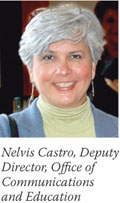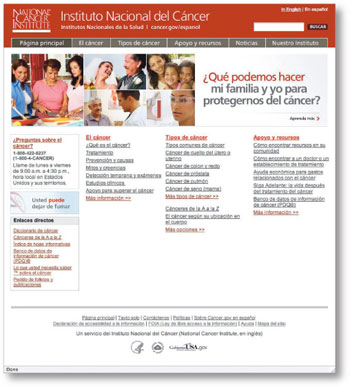
Guest Update by Nelvis Castro
Cancer Information for Hispanics and Latinos
 More and more Americans are surviving cancer and are continuing to live productive lives. However, many Hispanics and Latinos in the United States have not heard this message, and they have not benefited from advances in early detection and treatment. NCI's new Spanish-language Web site (http://www.cancer.gov/espanol), launched yesterday, strongly communicates the message that cancer can be prevented and treated, in addition to offering information on all aspects of the disease.
More and more Americans are surviving cancer and are continuing to live productive lives. However, many Hispanics and Latinos in the United States have not heard this message, and they have not benefited from advances in early detection and treatment. NCI's new Spanish-language Web site (http://www.cancer.gov/espanol), launched yesterday, strongly communicates the message that cancer can be prevented and treated, in addition to offering information on all aspects of the disease.
From the very beginning, our goal was to create a site tailored to meet the needs of Latinos who seek cancer information online. Rather than simply translating the English version of the site - which would be no small task in itself - we developed a site designed specifically for this audience. The pages are organized around the issues of greatest concern to Latinos, based on surveys and focus groups.
Latinos are the fastest growing online audience in the United States, and those who look for cancer information online tend to be "intermediaries" for patients, such as family members and health professionals. Many are bilingual and are comfortable reading something in one language and talking about it in another. The site allows users to toggle back and forth between pages in English and in Spanish.
 The most important questions to all users in our surveys were, "What is cancer?" followed by, "Where can I go for screening and treatment?" Cancer.gov en español is organized to allow users to easily find answers to these questions and to find information about different types of cancer and about support and resources available to cancer patients and their families. The site also addresses common myths and beliefs about cancer, including the view that cancer, in general, cannot be treated successfully. These myths and beliefs are barriers to screening and treatment, and we hope the information on the site will help overcome them. In addition, the site features testimonials from Latinos about the entire cancer continuum, from prevention to survivorship.
The most important questions to all users in our surveys were, "What is cancer?" followed by, "Where can I go for screening and treatment?" Cancer.gov en español is organized to allow users to easily find answers to these questions and to find information about different types of cancer and about support and resources available to cancer patients and their families. The site also addresses common myths and beliefs about cancer, including the view that cancer, in general, cannot be treated successfully. These myths and beliefs are barriers to screening and treatment, and we hope the information on the site will help overcome them. In addition, the site features testimonials from Latinos about the entire cancer continuum, from prevention to survivorship.
NCI's new Web site represents another milestone in our efforts to fight disparities in cancer outcomes between Latinos and other groups in the United States. It complements existing Spanish-language resources from NCI, such as the Cancer Information Service (1-800-4-CANCER), which provides callers with information about cancer prevention, diagnosis, treatment, and research.
By 2050, it's estimated that Latinos will make up a quarter of the U.S. population. National efforts to control cancer must include interventions and information directed at this group, as the authors of last year's Annual Report to the Nation on the Status of Cancer noted in a special section on the U.S. Latino population. They emphasized that this population is diverse and it may not be possible to compare research on groups that do not share the same origins, cultural traditions, and immigration status.
Cancer.gov en español currently contains 23 Web pages on different types of cancer, more than 100 peer-reviewed cancer treatment summaries for health professionals and patients, and a dictionary that includes 5,000 terms and definitions in both Spanish and English. In the coming year, NCI will continue to test the site to ensure that it meets the information needs of U.S. Latinos.
The development of Cancer.gov en español was a major effort that included many people across NCI and from the Latino community. I have been inspired by the creativity and hard work of the team behind the new Web site. The project could not have succeeded without the expertise of cancer physicians, researchers, health educators, translators, Web designers, and, most importantly, the Hispanic and Latino communities.
I want to thank everyone for their many contributions. It is a great privilege to be able to provide knowledge and messages of hope to Hispanics and Latinos concerned about cancer.
|